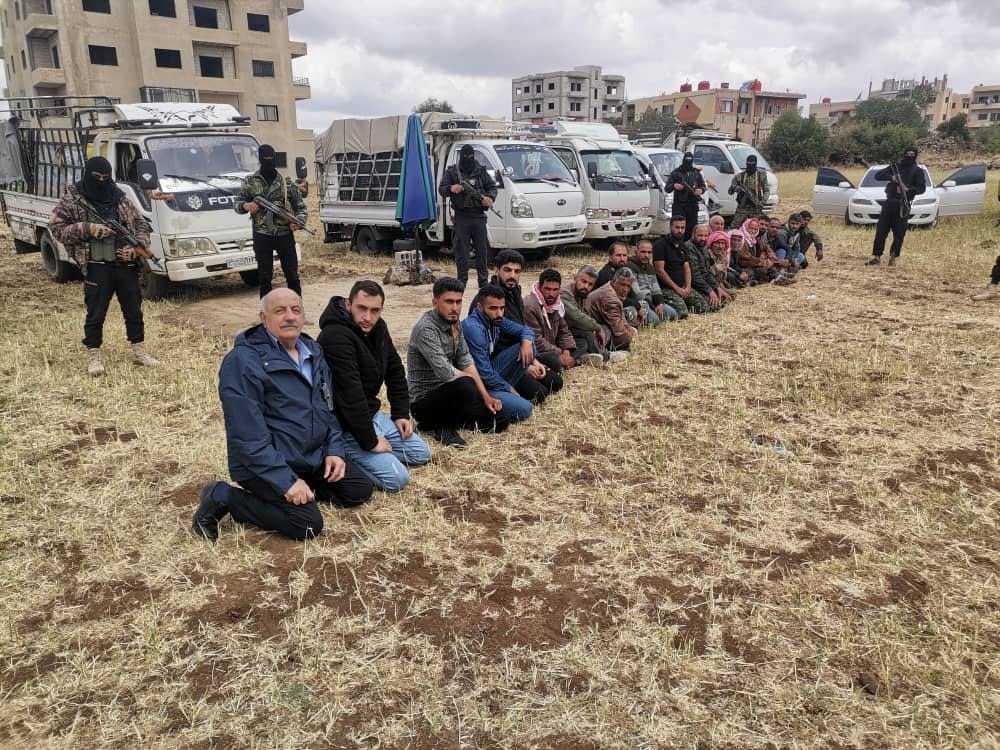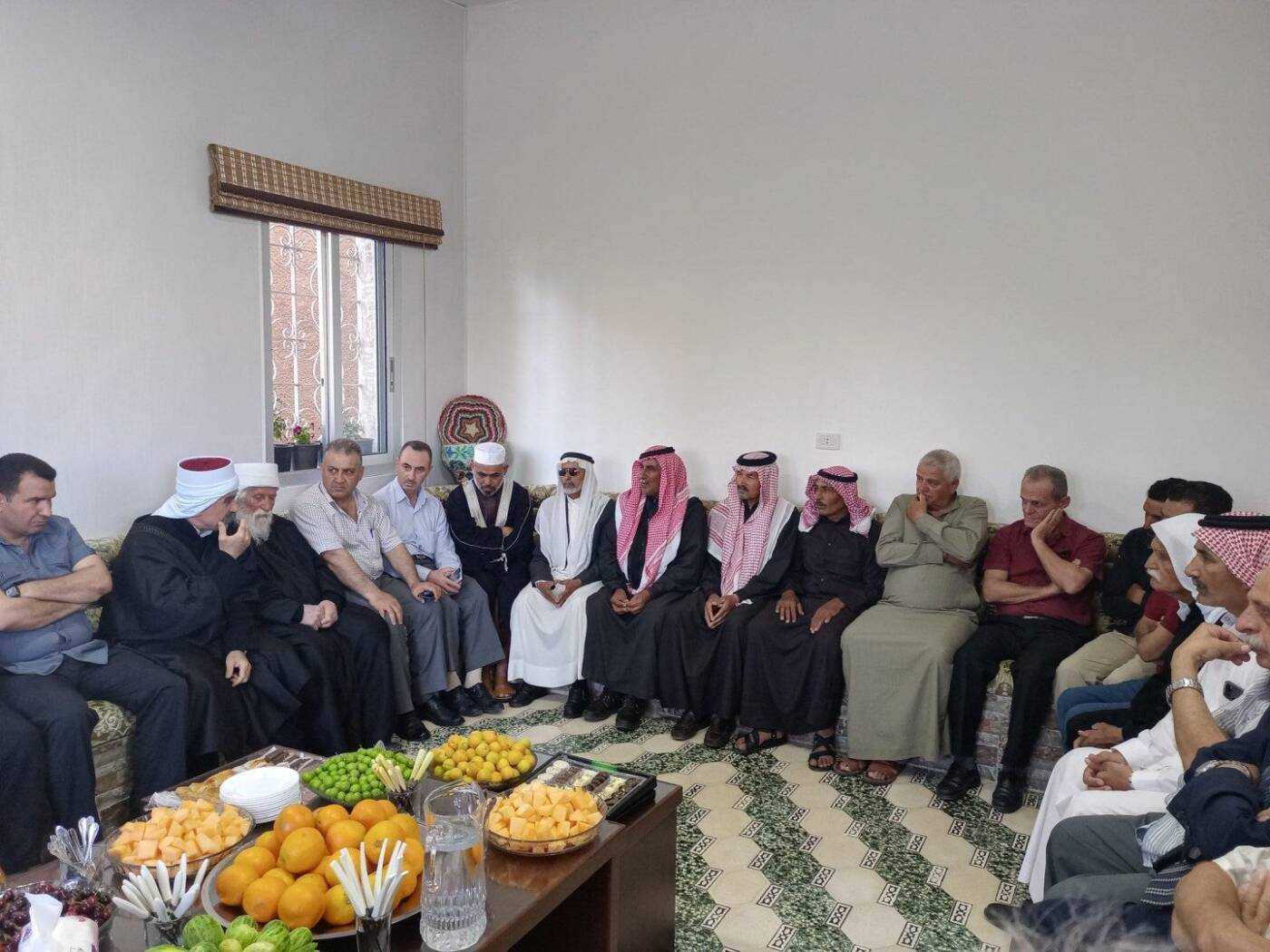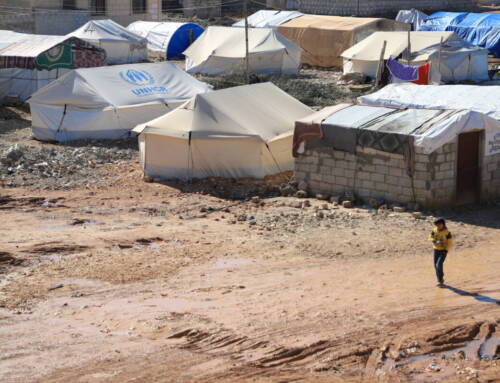In Suwayda, ‘organized gangs’ serve as an arm of Damascus and violence threatens to ignite interfamilial conflicts
In Suwayda, ‘organized gangs’ serve as an arm of Damascus and persistent lawlessness threatens to ignite interfamilial conflicts, while the success of community initiatives to keep the peace varies.
15 June 2022
PARIS — In the early morning hours of June 9, a body was found near the al-Mashnaqa roundabout in Syria’s southern Suwayda city. It belonged to Samer al-Hakim, the commander of the opposition Anti-Terrorism Force faction, who died after clashes between his group and forces from Syria’s Military Intelligence Directorate and local groups affiliated with it.
The previous day, clashes between the two sides in the village of Khazma, in southeastern Suwayda, ended with al-Hakim shooting himself, his faction said via its official Facebook page. The Anti-Terrorism Force was eradicated and its remaining members fled into the Syrian desert.
The Anti-Terrorism Force was established in July 2021 as a military arm of the Hizb al-Liwa opposition party in Suwayda province. Its stated goal was to “fill the security vacuum” in Suwayda as a result of what it called “the corruption of the security services and their transformation from the role of protector to supporting terrorism and terrorist gangs.” It also purported to protect state institutions and civilians and fight drug smuggling and dealers in southern Syria, according to the faction’s founding declaration.
After al-Hakim’s death and the clashes that preceded it, Druze spiritual leader Sheikh Hikmat al-Hijri held the heads of Suwayda’s security branches responsible for the chaos in the province. Speaking to a local news network, he accused them of “sowing division in the same house” and demanded their dismissal.
The Damascus government has not issued an official statement about the June 8 clashes, nor have any of those responsible for the incident commented. But the incident appears to reflect ongoing regime efforts to root out factions opposed to it, or that work outside the framework of coordination with its security services.
Damascus continues to support local factions and groups aligned with it “in an organized and systematic manner” to carry out killings and kidnappings against civilians and opponents, according to Ibrahim Salem (a pseudonym), a prominent figure in Suwayda’s northern city of Shahba.
In May, Suwayda recorded the killing of 21 civilians, including three individuals killed by regime-supported military factions. Others were killed by unidentified individuals, a local faction, or due to crimes, suicide or a landmine explosion, according to Suwayda 24, a local opposition media organization.
Suwayda has been living with a state of lawlessness and uncontrolled weapons for years. This is despite the province, where Druze make up 90 percent of the population, maintaining neutrality towards the Damascus government. While nominally controlled by the regime, Suwayda’s political and religious leaders have distanced themselves from events outside the province to the point of resembling an autonomous region. Local factions largely focus on protecting the province and repelling any external attacks.
‘Organized gangs’
In late May, the “Falhout group”—named for its leader Raji Falhout—associated with military security, raided a swimming pool in the al-Maqous district of Suwayda city, inhabited by Bedouins. The Falhout group was searching for individuals wanted by the Syrian regime, and in the attack killed three people, injured four others and kidnapped nine.
In response, victims’ relatives blocked the roads and lit tires in the streets. Falhout and his group returned to the neighborhood and clashed with armed residents. In the fighting, a police officer passing near the area was killed.
At the beginning of May, the same group detained 20 people from Daraa and Bedouin tribes in Suwayda and seized their cars in order to recover a car that was stolen from a sheikh in Suwayda city and sold in the Daraa countryside, Falhout claimed in a post on his personal Facebook account.

Daraa residents and members of Suwayda Bedouin tribes who were kidnapped by the military security-affiliated Raji Falhout group in Suwayda city, 7/5/2022 (Raji Falhout)
Killing and kidnapping for ransom or to create chaos in Suwayda has become an “intractable security crisis,” said Rayan Maarouf, director of the local Suwayda 24 network. He attributed that to “the decline of the supposed role of the state, since Suwayda did not leave regime control throughout the years of the revolution.”
After the Syrian revolution broke out in March 2011, dozens of local military factions and groups emerged in Suwayda. Some took up the task of defending the province and maintaining security and stability in it. A number of military factions and groups received support from the regime to conduct military operations against Syrian opposition factions and target its opponents inside Suwayda.
Damascus, rather than using “a policy of excessive repression, which it followed in the rest of the provinces” to silence opponents, took another approach with Suwayda “because the majority of its residents are Druze,” Maarouf said. “It directly contributed to rooting a state of lawlessness by neutralizing the judicial police and judiciary, freeing the hands of the security services, and supporting armed militias implicated in violations, kidnappings, and murders,” he added, calling the regime-affiliated groups “organized gangs.”
Salem, a Shahba city notable, agreed with that reading, and accused “the security services and Iran of feeding chaos in Suwayda.” He pointed to “all the undisciplined gangs and factions carrying security cards from the Military Intelligence division and receiving money and protection for years.”
Members of Raji Falhout’s group, for example, carry security cards issued by military security, and receive salaries and protection. In exchange, Salem said, they “carry out specific aims, the essence of which is to strike at civil peace on the mountain [Suwayda] and with the neighbors [Daraa province and Bedouin tribes].” He asked not to be identified by his real name for security reasons.
Out of control
The Falhout group is active in the town of Ateel, north of Suwayda city, and has less than 25 members, according to Maarouf. It is one among others in Suwayda that “adopt killing, kidnapping and drug trafficking to finance themselves,” he said. “It receives support from the Military Intelligence division, which grants security cards to facilitate freedom of movement in regime-controlled areas,” he added.
While the regime is “targeting its opponents” through such groups, according Salem, Iran and Hezbollah work to “enter this province through these gangs to increase drug dealing inside the province and smuggling to Jordan,” he said.
Through groups like Falhout’s Damascus can strike opponents and pursue people wanted for crimes in Suwayda, said Maarouf. Regime-backed groups act as though they have “absolute authority” and “kidnap and kill without any deterrent,” he said.
He suggested that chaos caused by such groups can “draw the community’s attention away from deteriorating economic and living conditions, by preoccupying them with the security situation and conflicts, be they internal or with the people of neighboring provinces.”
Persistent lawlessness “reinforces the state of division the Syrian people are experiencing, and threatens the region with bloody conflicts,” Maarouf said.
In his view, regime-backed groups in Suwayda could be discarded as soon as they are no longer of use. Damascus could then portray itself as “the community’s savior from gangs wreaking havoc.” However, recent events in the southern Syrian province warn of the possibility of these groups getting out of control.
On May 4, the Dawn Forces—a local group affiliated with military security—detained the Suwayda chief of police, the head of the Criminal Security branch and their companions for about an hour while they were heading to a meeting in the capital Damascus. The group released them in exchange for an individual detained in the al-Khateeb State Security branch.
On May 27, the family of Majd Sereiwi, who was tortured to death in November 2020 by the Falhout group, reached a “tribal reconciliation” agreement with “the Falhout family” under pressure and threat.
Sereiwi’s family, which is from Ateel, had previously refused to renounce their rights before the judiciary and refused many social mediation attempts by Raji Falhout to make peace. In response, Falhout and his group stormed the Sereiwi family house last month, and burned agricultural land surrounding it.
Community initiatives
The local community in Suwayda is making efforts to confront deteriorating security in the province. Some local factions support these efforts and “adopt the position of defending Suwayda and neutrality regarding the ongoing war in Syria, such as the Men of Dignity,” Maarouf said.
Community leaders are working to “contain any internal dispute, or with the neighbors, and prevent reactions,” Shahba notable Salem said. Their efforts do not always work, especially if one of the parties is among the “gangs associated with military security,” he qualified. “Reconciliation and harmony between community members goes against the purpose of these groups’ existence,” he said.
Following the Falhout raid of a swimming pool in Suwayda city in late May, Shahba city notables met, alongside social and religious authorities and tribal leaders, to “contain any possible conflict after what the Raji Falhout group did against the members of the tribes,” Salem said.
Despite the importance of civil initiatives, “the means of deterrence they have up their sleeves aren’t enough,” Maarouf said, and “fighting these groups, which are part of the social fabric, is complicated.” Furthermore, “some attempts to deter Suwayda gangs have turned into family conflicts.”
Independent local factions, such as the Men of Dignity, cannot play the role of the police, Maarouf said, since they “don’t receive direct support, and don’t have prisons or a specialized judiciary.” In addition to that, “they don’t have an absolute social mandate.”
In the past, independent factions and community members have “caught thieves or criminals and handed them over to the specialized authorities,” he added, “but many of them went without accountability.”
This report was originally published in Arabic and translated into English by Mateo Nelson.







